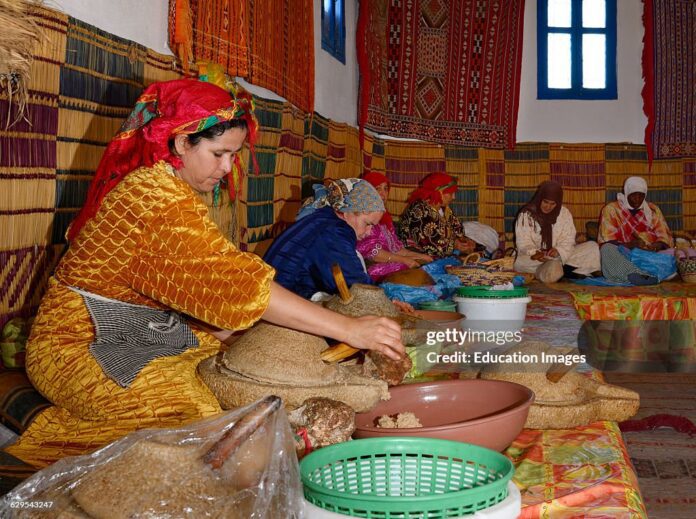Introduction
Argan oil has become an increasingly popular product around the world, appreciated for its nutritional value and unique flavor. Produced from the nuts of the argan tree exclusively found in Southwest Morocco, argan oil has been used locally for centuries in cooking and cosmetics. In recent decades, cooperatives have organized argan oil production to both boost local economies and preserve this endangered species.
However, rising global demand now presents an opportunity for growth that existing cooperatives are eager to capture. Scaling up production in a sustainable way brings challenges as well as rewards. In this article, I will explore practical strategies cooperatives can employ to scale up argan oil operations while maintaining social and environmental standards. Drawing on successful case studies and interviews, I will discuss approaches to financing, quality control, distribution, workforce expansion, and community development.
My goal is to equip cooperative leaders with actionable recommendations for navigating expansion responsibly and profitably. With care and planning, argan oil cooperatives can increase incomes for women producers, conserve argan forests, and satisfy ever greater worldwide appetite for their prized product. Scaling up offers a chance to spread their benefits more broadly – if undertaken intelligently and for mutual benefit.
Financing Growth
One of the greatest hurdles for cooperatives seeking to scale up is access to adequate financing. With increased volume comes needs for additional equipment, infrastructure upgrades, advanced training, larger inventories and more. While international development agencies and impact investors have supported argan cooperatives, their own capital reserves may be insufficient for ambitious expansion plans.
Some cooperatives have successfully tapped new sources of growth funding. The Targist cooperative in the Taroudant province, for example, partnered with nonprofit association AMITER to apply for grants from USAID and other donors earmarked for sustainable small business development. The funds allowed Targist to triple production capacity through building renovations and new processing machinery.
Cooperatives further along the path to scaling may qualify for traditional small business loans. The Souss-Massa cooperative union in Agadir obtained a loan from a Moroccan bank to construct a new multipurpose facility, with the building itself used as collateral. Repayments have been manageable thanks to the facility generating additional revenue streams.
Impact investors are also an increasingly viable option. The Anou cooperative recently closed a five-year, low-interest loan with the Oasis Fund, a venture capital firm that requires social and environmental responsibility from portfolio companies. Anou will use the capital to boost remote village collectors’ incomes through training and an incentive program for higher nut quality.
New models are emerging too, such as cooperative investment crowdfunding platforms where individuals provide small amounts of patient capital. Global cooperative collective Indiegogo runs one program assisting international projects in renewable energy and fair trade. Argan oil cooperatives seeking several hundred thousand dollars or more could attract many individual $25-$100 investments.
The key is for cooperatives to strengthen business plans, financial management, and impact reporting, demonstrating scalability and sustainability to potential investors. With thorough applications coupled to sound expansion strategies, financing growth remains very achievable.
Quality Assurance As Volume Increases
Scaling up can put pressure on product quality if controls are not augmented accordingly. For argan oil, assuring nutritional richness, consistency between batches and absence of contaminants is critical to retaining consumer trust and market access as volumes increase. Achieving and proving high standards requires continuous improvement in several areas.
Traceability systems tracking each nut back to its collector require reinforcement as the cooperative sources from greater numbers of villages over a wider landscape. Technologies like radio frequency identification (RFID) tagging and blockchain ledger recording offer solutions to scalably trace exponentially larger volumes. The Souss-Massa union’s traceability program powered by such tech won the cooperative new major bulk sales contracts from European buyers.
Testing and certification also must scale to statistically validate expanded production. Partnering with specialized labs for nutrient analysis, toxin screening and other quality tests on larger randomized samples provides both safety assurances and marketing advantages as production rises. Several cooperatives now send staff annually to labs in Europe and Morocco for Good Manufacturing Practices certification, opening doors to bigger wholesale clients.
Consistent roasting is vital for argan oil’s prized flavor yet difficult as ovens wear with time and use. Targist’s recent double oven installation now allows synchronous smaller roasting batches by dedicated workers, maintaining optimal conditions more easily as volumes multiply. Anou oversees regular maintenance and technicians employed specifically on quality management.
With diligence across traceability, testing, certification and processing routines, quality assurance can strengthen in step with sales expansion. Addressing such operational aspects proactively builds confidence for customers and investors as cooperatives scale up argan oil production.
Distribution and Wider Markets
Growing beyond domestic and local export markets requires cooperatives to extend distribution channels, identify higher volume buyers, and potentially serve new product categories. While some cooperatives exclusively focus on fair trade retail partnerships, others seeking bolder scale-up have explored new avenues.
The Souss-Massa union secured supermarket and restaurant supply deals in Europe by exhibiting at major trade shows in Germany, France and Italy to introduce stakeholders to argan oil. Their booth highlighted nutritional research, eco-friendly practices, and lucrative private label partnerships available through the 300-member cooperative’s steadily increasing harvests. Major buyers hosted Souss-Massa on sourcing trips to evaluate facilities and meet producers.
Some cooperatives capitalize on culinary uses beyond traditional Moroccan cooking. Targist developed an argan oil-infused halwa candy sold in Middle Eastern groceries across the globe. An initial shipment proved so popular Targist now allocates 5% of output monthly to candy production through a factory subcontract. The product diversification multiplies income per liter roasted.
Advanced digital platforms break into wellness and cosmetics channels online. The Zagora Women’s Cooperative markets a line of argan oil soaps and serums via Amazon as well as their own website, directing consumers to stories of women artisans behind each purchase. Nearly 20% of sales originate online, and packaging denotes organic certification and fair conditions to reach conscious global customers.
These distribution channels require investment in marketing, logistics and compliance but connect cooperatives more directly to swelling worldwide demand. With care taken to ensure fair renumeration passes back up the supply chain, such market expansion can sustainably scale livelihood benefits for Moroccan argan producers. Continuous innovation serves to stay ahead of the competition as volumes and customer bases grow substantially.

Workforce Development for Higher Yields
While technology assists scaling operations, argan nut collection and oil processing remain heavily labor-intensive. Increasing cooperative membership and specialized skills training empowers more women economically while elevating overall yields.
Targist spearheaded an outreach program welcoming new villages to supply their trebled capacity. Recruited members attended courses in sustainable harvest techniques maximizing nut quantities retrieved per tree without damaging foliage. This ‘Train the Trainer’ program proliferated good practices enhancing the sustainability and productivity of argan forests as the cooperative’s producer base expands geographically.
Anou implements incentives for qualified mentors who coach part-time collectors seeking to commit more fully. Master roasters facilitate skills-share workshops perfecting techniques. As lower-skilled workers upgrade, efficient division of complementary roles boosts total argan nut processing capabilities within the cooperative.
The Souss-Massa union sponsors full scholarships for qualified daughters of producers to attend agroforestry technical schools. Graduates return with certificates in grafting, integrated pest management and mechanized gathering methods. Their training increases both current harvests and regenerates areas falling into disuse through revitalizing cultivation expertise. Older groves yield more for longer thanks to these younger professionals empowered through cooperative-funded education programs.
By cultivating specialized talent from within, cooperatives scale capacities for argan production sustainably while diffusing benefits to future generations of women. This positive cycle ensures quality supplies to accompany sales growth for decades to come.
Community Development & Social Impact
Cooperatives scaling up production aim not just for increased income but holistic livelihood improvements. Several initiatives prove how greater social development accompanies financial progress through cooperation.
Zagora prioritizes constructing schools and medical clinics in remote villages through collective taxes levied upon each year’s total sales. Infrastructure upgrades lift standards of living for all residents, attracting youth back from cities with long-term careers in the cooperative’s operations. This virtuous cycle secures both a next generation workforce as well as irrigated community development.
Anou spearheaded a subsidized public transport network linking outlying villages to urban centers via buses retrofitted to run on argan oil biofuel. This eco-friendly mobility solution cuts travel costs and isolation for part-time collectors. Higher participation rates follow as viable transport solves a critical barrier preventing full-time commitment and skills upgrading programs previously only accessible from nearby towns.
Souss-Massa cooperatives manage rotational savings funds circulating cash among member producers each harvest season. Administered democratically through representatives, the collective pot provides microcredit accessed as needed for events like medical emergencies, marriages or home improvements without predatory interest rates. This financial safety net embraces shared responsibility across the cooperative’s increasing membership as it expands into new communities.
FAQs
Comments
0 comments

